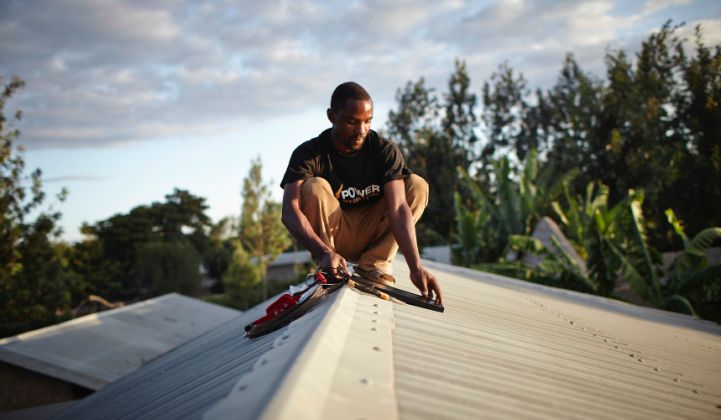Off-Grid Electric closed a Series C investment worth $25 million on Wednesday to expand its micro-solar leasing platform in Africa.
The round was led by DBL Partners, which provided the majority of the funding, and also included Western Technology Investment and previous investors SolarCity, Omidyar Network, Serious Change LP, Vulcan Capital and the private investment firm of Microsoft co-founder Paul Allen. Off-Grid raised $23 million last year.
The funds will be used to enter its second African market, Rwanda, and to continue to scale up its partnership with the Tanzanian government to power 1 million homes by 2017.
“Our real intention is to light considerable parts of countries here. We want to provide an electrification solution that’s different and much more cost-effective [than the grid],” said Xavier Helgesen, co-founder and CEO of Off-Grid Electric.
Given the falling cost of solar and batteries and the groundwork laid by many nonprofits, the market is strengthening for off-grid distributed renewables in developing countries. Last year, nearly $64 million was invested in off-grid solar solutions.
The Global Off-Grid Lighting Association estimates today's off-grid solar market at $300 million annually, and 2015 investment figures are likely to be higher than 2014.
Other large solar companies are paying attention. SunEdison has committed to bring power to 20 million people by 2020 through a range of business models and technology offerings deployed by local partners.
The investment is DBL’s first overseas, but a natural fit given that Nancy Pfund is a longtime investor and board member of another Off-Grid Electric investor, SolarCity. Nancy Pfund will join Off-Grid Electric as chair of the board.
“I’ve been able to see how good they are with execution,” Pfund said of watching Off-Grid Electric grow since SolarCity first become acquainted with the company. “We can accelerate their learning curve on how to do this right.”
Off-Grid Electric follows SolarCity’s approach but tailors it for the African market. As with SolarCity’s leasing model, Off-Grid Electric allows people to pay for the electricity from solar without owning a system outright.
But Off-Grid Electric diverges from SolarCity there. It uses a mobile-payment platform to allow customers to purchase energy in small amounts, essentially a micro-solar leasing model that the company has dubbed M-Power. The model is working, and the startup is installing more than 10,000 systems per month and employs more than 800 people in Tanzania.
“This is the time,” said Pfund. “This market demands an entrepreneurial solution.”
There are different levels of service available. The basic service costs about $6 to set up and about $6 per month, less than what most people pay for kerosene. It comes with LED lights, a radio and a USB charger. Unlike kerosene, which offers poor light and spews toxic fumes, the electricity from solar provides better lighting when coupled with LEDs. For more money, larger systems can provide extra energy for charging more mobile phones and powering appliances and televisions.
Most customers start with the basic service, said Helgesen. They tend to upgrade after a few months once they get comfortable with the company’s services and know they’re reliable.
In most regions where Off-Grid Electric operates, it is not cost-effective for utilities to serve customers. Some of Off-Grid’s customers were once utility customers who were disconnected for nonpayment and could not afford the high fees for reconnection.
To deliver the energy needed at the right price, Off-Grid Electric has invested in proprietary hardware platforms that bring together lithium-ion batteries, solar panels and the most efficient LEDs and appliances available. “We are relentless in our search” for efficient hardware, said Helgesen. If energy hogs are hooked up to the solar systems, he added, it’s just bad business.
“You can’t be wasteful,” he said. “So you have to use the system efficiently or you won’t be happy with it.”
The company either sells or leases products such as televisions and radios, and is looking for a refrigerator that would fit well with the solar and lithium-ion system for small businesses.
One issue that Off-Grid Electric will not be able to solve alone is replacing dirty cooking fuels with solar-powered options. Electric cooking appliances, such as hot plates and kettles, draw a tremendous amount of energy when they’re on. It is a considerable problem. Dirty cooking fuel, such as charcoal, is estimated to kill 4 million people each year. But it's not a fuel that solar can replace cost-competitively, said Helgesen.
The latest round of funding will help Off-Grid Electric become the electric company it wants to become. But there are other financing challenges. Lowering the cost of capital for projects is an ongoing issue for the startup -- something that Nancy Pfund may be able to help with, given her networks.
The opportunity is vast. When people talk about the 1.3 billion people living without electricity, they often don’t realize that there are at least a billion more people with a grid connection that’s often expensive and unreliable. Those are customers also willing to invest in complementary solutions like solar.
“That’s all of Africa. The grid could be treated as an intermittent resource just like solar," said Helgesen.



